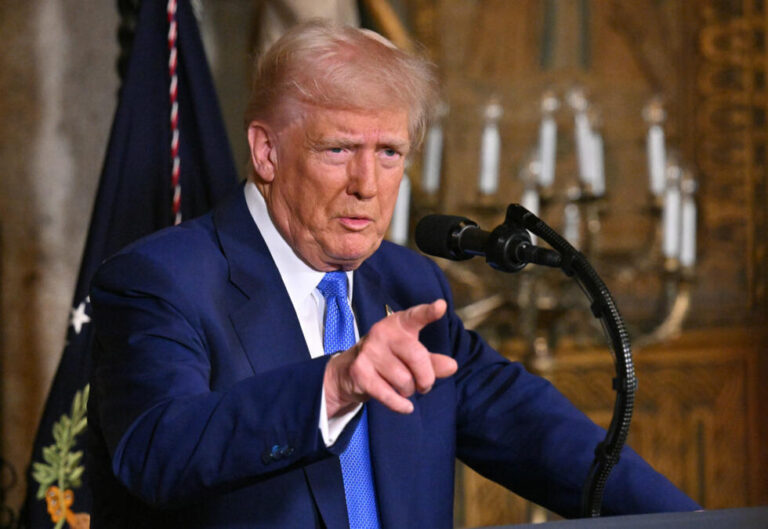US President Donald Trump has expanded his offensive against trading partners, threatening 25 percent tariffs on imported cars, and similar or higher duties on pharmaceuticals and semiconductors.
Trump has announced a broad range of levies on some of the biggest US trading partners since taking office in January, arguing that they will help tackle unfair practices – and in some cases using the threats to influence policy.
Specifics to come around April 2
He recently pledged 10% duties on all goods coming from China, and 25% on steel and aluminum imports.
At his Mar-a-Lago resort in Florida, he told reporters that tariffs on the automobile industry will “be in the neighborhood of 25 percent,” with specifics to come around April 2.
Asked about threatened tariffs on pharmaceuticals and chips, Trump said: “It’ll be 25 percent and higher, and it’ll go very substantially higher over (the) course of a year.”
He added he wanted to give affected companies time to bring their operations to the United States, saying that he had been contacted by major firms that “want to come back”.
The president also said that Washington’s trading partners could avoid being taxed by investing in factories in the United States.
“We want to give them time to come in,” he said.
“When they come into the United States and they have their plant or factory here, there is no tariff. So we want to give them a little bit of a chance.”
Experts have warned it is often Americans who end up paying the cost of tariffs on imports, rather than foreign exporters.
About 50 percent of the cars sold in the United States are manufactured within the country.
Among imports, about half come from Mexico and Canada, with South Africa, Japan, South Korea and Germany, also major suppliers.
Asia cautious
Trump’s tariffs threats have been cautiously received in Asia, home to some of the main US suppliers of the potentially affected industries.
Yoshimasa Hayashi, Tokyo’s top government spokesman, told reporters “with regard to automobile tariffs, we have raised the issue with the US government, taking into account the importance of Japan’s auto industry.
“Japan will first take appropriate action while carefully examining the specific details of the measures,” he added.
Taiwan, a global powerhouse in semiconductor production that Trump has accused of stealing the US chip industry, also remained cautious.
“The scope of products subject to tariffs has not yet been clarified. We will continue to monitor the direction of US policies and assist Taiwan’s industries,” Taipei’s economic ministry said in a statement.
The island’s government had previously said it would boost investment in the United States as it sought to head off Trump’s duties.
Meanwhile a spokesperson for Malaysia’s semiconductor industry, which accounts for around 13 percent of global back-end manufacturing, told AFP on Wednesday the United States would be “slapping themselves” with the new tariffs.
Malaysia has long been a chip manufacturing hub for many US semiconductor companies.
“If we (Malaysia) ship these products back to the US, it will only increase the cost of components back to the US,” Malaysia Semiconductor Industry Association president Datuk Seri Wong Siew Hai said.
EU visit
Trump said he was pleased to see the EU “reduce their tariffs on cars to the level we have.”
“The EU had 10 percent tax on cars and now they have a 2.5 percent tax, which is the exact same as us… If everybody would do that, then we’d all be on the same playing field,” he said.

“The EU has been very unfair to us. We have a trade deficit of $350 billion, they don’t buy our cars, they don’t take our farm products, they don’t take almost anything… and we’ll have to straighten that out,” he added.
The US trade deficit in goods with the EU was over $235 billion in 2024, according to Commerce Department data.
On the other hand, the United States had a trade surplus of $109 billion with the EU in services in 2023, the last year with consolidated data, according to European Commission data.
The European Commissioner for Trade and Economic Security, Maros Sefcovic, arrived in Washington on Tuesday and will meet with Trump’s Commerce Secretary Howard Lutnick and US Trade Representative nominee Jamieson Greer.
Can you appreciate where Donald Trump is coming from with his ‘MAGA’ decisions?
Let us know by leaving a comment below, or send a WhatsApp to 060 011 021 1
Subscribe to The South African website’s newsletters and follow us on WhatsApp, Facebook, X and Bluesky for the latest news.

